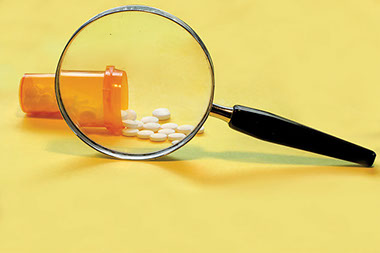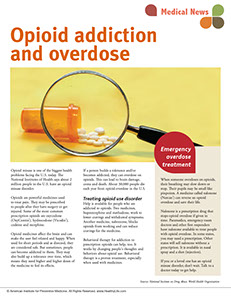MEDICAL NEWS
Opioid addiction and overdose

Opioid misuse is one of the biggest health problems facing the U.S. today. The National Institutes of Health says about 2 million people in the U.S. have an opioid misuse disorder.
Opioids are powerful medicines used to treat pain. They may be prescribed to people after they have surgery or get injured. Some of the most common prescription opioids are oxycodone (OxyContin®), hydrocodone (Vicodin®), codeine and morphine.
Opioid medicines affect the brain and can make the user feel relaxed and happy. When used for short periods and as directed, they are considered safe. But sometimes, people can become addicted to them. They may also build up a tolerance over time, which means they need higher and higher doses of the medicine to feel its effects.
If a person builds a tolerance and/or becomes addicted, they can overdose on opioids. This can lead to brain damage, coma and death. About 30,000 people die each year from opioid overdose in the U.S.
Treating opioid use disorder
Help is available for people who are addicted to opioids. Two medicines, buprenorphine and methadone, work to lower cravings and withdrawal symptoms. Another medicine, naltrexone, blocks opioids from working and can reduce cravings for the medicine.
Behavioral therapy for addiction to prescription opioids can help, too. It works by changing people's thoughts and behaviors about opioid use. Behavioral therapy is a proven treatment, especially when used with medicines.
Emergency overdose treatment
When someone overdoses on opioids, their breathing may slow down or stop. Their pupils may be small like pinpoints. A medicine called naloxone (Narcan®) can reverse an opioid overdose and save their life.
Naloxone is a prescription drug that stops opioid overdose if given in time. Paramedics, emergency room doctors and other first responders have naloxone available to treat people with opioid overdose. In some states, you may need a prescription. Other states will sell naloxone without a prescription. It is available in nasal spray and a shot (injection).
If you or a loved one has an opioid misuse disorder, don’t wait. Talk to a doctor today to get help.
Sources: National Institute on Drug Abuse, World Health Organization

Download an offline pdf file.
MEDICAL NEWS ARTICLES
<
>
2021 © American Institute for Preventive Medicine - All Rights Reserved. Disclaimer | www.HealthyLife.com








